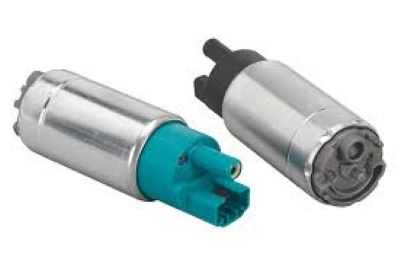Mechanical pumps, electric pumps and turbo pumps are all common fuel pump types that have been engineered to cater to different applications and assorted engine-types. Older vehicles with carbureted engines have mechanical pumps that draw fuel from the tank by using a diaphragm activated by the engine's camshaft. These pumps generally run at lower pressures, usually 4-10 psi (pounds per square inch), which work perfectly for carbureted engines that do not need much pressure to route the fuel. That said, while mechanical pumps are a tried and true technology on classic engines, they aren't necessarily the best application for modern fuel-injected systems.
Most fuel-injected vehicles use electric fuel pumps. These pumps are mounted inside or in close proximity to the fuel tank and produce pressures between 40-60 psi for adequate metering at injection — essential to efficient and stable engine operation. Electric pumps can also control fuel flow more effectively than mechanical pumps since the amount of fuel is adjusted to suit engine demand, leading to efficient fuel consumption and a reduction in emissions. Electrical pumps are extremely reliable — many go 100k to 150k miles — and have internal sensors to monitor pressure levels.

Turbo pumps, used in higher-performance and forced induction engines, will pump a great deal of fuel at elevated pressures called for by the high pressurized demand usually induced by turbocharged systems. Since turbo pumps are made to withstand pressures well over 60 psi, this means they are perfect for engines that demand quick fuel flow to cope with higher horsepower. Built with the boosted environment in mind they are often reinforced for longevity to cope with higher temperatures and pressures encountered in turbocharged applications.
High-flow electric fuel pumps are for performance use, such as racing, where the engine is run at high RPM and need a steady flow of fuel. They have higher-flow pumps, meaning you can support an engine with more than 500 horsepower (something that admittedly wasn't a concern for most factory-sized turbo cars) While high-flow pumps can often be efficient, they sometimes need more substantial power sources and are best used in specialty vehicles, rather for everyday use.
Legendary automotive designer Carroll Shelby once quipped, “Horsepower sells cars, but torque wins races. Fuel pumps are a major factor in supporting both horsepower and torque, as they are essential to provide constant fuel flow necessary for optimum engine performance. This is where reliable sources such as Fuel Pump come to the fore by offering a model for different engine requirements and ensuring that your engines deliver optimum performance while providing substantial life across applications.